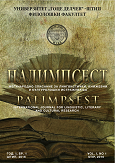PREDATORY PUBLISHING
Abstract
The rise and development of electronic publishing has followed the development of open access to information. Open access to electronic publications allows users to freely access and use published scientific papers. This type of publishing offers a number of advantages, but it also opens up opportunities for abuse. The emergence of predatory(fake) publications and publishers is one of them. This type of publications dates back about ten years and they are serious problem for the research staff, since the papers sent to the publisher are already lost scientific papers. In addition to predatory journals, predatory conferences have become quite popular lately, which are essentially for-profit, low-quality academic meetings that researchers use to share and present their scientific research. The purpose of this paper is to give a clearer picture of predatory publishers, predatory journals and predatory conferences, so that researchers can more easily identify and protect their scientific papers.
Keywords: electronic publishing, predatory publishers, predatory journals, predatory conferences, Open Access, researchers.
Downloads
References
Перић К. П., Тимотијевић Т. С., Димитријевић Ж. Н. (2016). Публиковање у отвореном приступу и појава предаторских часописа и издавача. Библиотекар, 1-2, 39-59; ISSN 0006-1816.
***
Beal J. (2016). Proposed Criteria for Identifying Predatory Conferences. Scholarly Open Accesss. https://scholarlyoa.files.wordpress.com/2016/06/proposed-criteria-for- identifying-predatory-conferences.pdf (Accessed 12.03.2020).
COPE Discussion Document: Predatory Publishing. (2019). Committee on Publication Ethics Council. DOI: https://doi.org/10.24318/cope.2019.3.6
Crotty D. (2017). Predatory publishing as a rational response to poorly governed academic incentives. The Scholarly Kitchen 28/02/2017. https://scholarlykitchen.sspnet.org/2017/02/28/
Grudnewicz A., Moher D., Cobey D. C. (2019). Predatory Journals: No Definition, No Defence. Nature 576, 210-212 . DOI: 10.1038/d41586-019-03759-y
Principles of Transparency and Best Practice in Scholarly Publishing, Version 3 (2018). Committtee on Publication Ethics, Directory of Open Access Journals, Open Access Scholarly Publishers Association, World Association of Medical Editors. DOI: https://doi.org/10.24318/cope.2019.1.12
Tao T. (2020). India’s Fight Against Predatory Journals: An Interview with Professor Bhushan Patwardhan. The Scholarly Kitchen 05/02/2020. https://scholarlykitchen.sspnet.org/2020/02/05/
Think. Check. Submit.(n.d.) http://thinkchecksubmit.org/check (Accessed 11.03.2020).
What is DOAJ's policy on “predatory” publishers and journals? Directory of Open Access Journals. (n.d.). https://doaj.org/faq. (Accessed 10.03. 2020).





